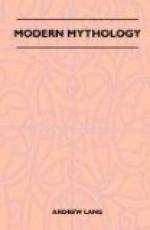Now I really did believe—perhaps any rapid reader would have believed—when I read Mr. Max Muller, that I must have tried to account for the story of Daphne by the story of Tuna. I actually wrote in the first draft of this work that I had been in the wrong. Then I verified the reference which my critic did not give, with the result which the reader has perused. Never could a reader have found out what I did really say from my critic, for he does not usually when he deals with me give chapter and verse. This may avoid an air of personal bickering, but how inconvenient it is!
Let me not be supposed to accuse Mr. Max Muller of consciously misrepresenting me. Of that I need not say that he is absolutely incapable. My argument merely took, in his consciousness, the form which is suggested in the passage cited from him.
Tuna and Daphne
To do justice to Mr. Max Muller, I will here state fully his view of the story of Tuna, and then go on to the story of Daphne. For the sake of accuracy, I take the liberty of borrowing the whole of his statement (i. 4-7):—
’I must dwell a little longer on this passage in order to show the real difference between the ethnological and the philological schools of comparative mythology.
’First of all, what has to be explained is not the growing up of a tree from one or the other member of a god or hero, but the total change of a human being or a heroine into a tree, and this under a certain provocation. These two classes of plant-legends must be carefully kept apart. Secondly, what does it help us to know that people in Mangaia believed in the change of human beings into trees, if we do not know the reason why? This is what we want to know; and without it the mere juxtaposition of stories apparently similar is no more than the old trick of explaining ignotum per ignotius. It leads us to imagine that we have learnt something, when we really are as ignorant as before.




